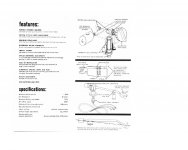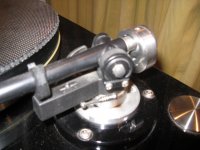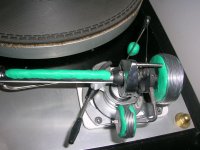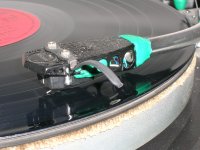The Empire 980 arm in the 398 and the arm in the 698 use a clock mainspring to apply force. The arm remains dynamically balanced around the pivot points so the force doesn't depend on bending moment (torque) of the weight difference. Every time I've ever checked it against a gage, the reading was exactly what the spring calibration said it would be. IMO that's the optimal design for applying tracking force to a pivoted arm or a radial one for that matter.
The Empire 980 arm in the 398 and the arm in the 698 use a clock mainspring to apply force. The arm remains dynamically balanced around the pivot points so the force doesn't depend on bending moment (torque) of the weight difference. Every time I've ever checked it against a gage, the reading was exactly what the spring calibration said it would be. IMO that's the optimal design for applying tracking force to a pivoted arm or a radial one for that matter.
True
Empire 980 Owners Manual, Service Manual, Schematics, Free Download | Vinyl Engine
Regards
George
Attachments
Yes but there are coils and there are coils... sometimes the coils used can indice some nasty effects due to their particular build.
When not using warped records (most of the time in my case) I really prefer the less coloured sound of the simpler systems.
There is always a tradeoff... In my RB300 I try to push the balance weight to the pivot so I get less momentum, and use the coil to set the propper VTF.
In the case of the lower mass B&O arm i did the contrary and set the coil to 0 and counterbalanced using only the counterweight for best results.
When not using warped records (most of the time in my case) I really prefer the less coloured sound of the simpler systems.
There is always a tradeoff... In my RB300 I try to push the balance weight to the pivot so I get less momentum, and use the coil to set the propper VTF.
In the case of the lower mass B&O arm i did the contrary and set the coil to 0 and counterbalanced using only the counterweight for best results.
Last edited:
Yes but there are coils and there are coils... sometimes the coils used can indice some nasty effects due to their particular build.
This is correct. But soundminded pointed (I think) to it as a design concept for achieving optimum dynamic balance. Good practical implementation is indeed difficult.
originally posted by soundminded
IMO that's the optimal design for applying tracking force to a pivoted arm or a radial one for that matter.
Spring loading though is hard (impossible ?) to apply on uni-pivoted arms.
When not using warped records (most of the time in my case) I really prefer the less coloured sound of the simpler systems.
In such cases (flat records,) hardly anyone will object to this.🙂
Regards
George
There is always a tradeoff... In my RB300 I try to push the balance weight to the pivot so I get less momentum, and use the coil to set the propper VTF.
Ricardo,
it is recommended, on the RB300, to put the force at full, so the VTF spring does not affect the armtube. Then set VTF with the weight. If you want to put the weight closer to the pivot, increse it' s mass.
This is the reson many people prefer the RB250, that doesn' t have a sping.
Thank you Vgeorge
That is precisely what I meant.
I noticed a benefic effect when using the weight nearer to the pivot, but as I am now using a DL103, I can not do that (due to the weight of the cart)... maybe you could suggest a good way to increase the counterweight mass....
That is precisely what I meant.
I noticed a benefic effect when using the weight nearer to the pivot, but as I am now using a DL103, I can not do that (due to the weight of the cart)... maybe you could suggest a good way to increase the counterweight mass....
In mine, I use an aftermarket couterweight, that is already heavier, and to this I glued some extra iron rings. There is also an alen screw on it, to secure it to the armtube.
Of course it is not as convinient to adjust VTF, but I think is better.
Of course it is not as convinient to adjust VTF, but I think is better.
My way to increase the mass 😀
No ringing, no extra money, adjustable to my needs (weight and shape) .🙂
Regards
George
No ringing, no extra money, adjustable to my needs (weight and shape) .🙂
Regards
George
Attachments
Last edited:
- Status
- Not open for further replies.
- Home
- Source & Line
- Analogue Source
- Tracking force



